The New Order and the Future of Boxing: part two
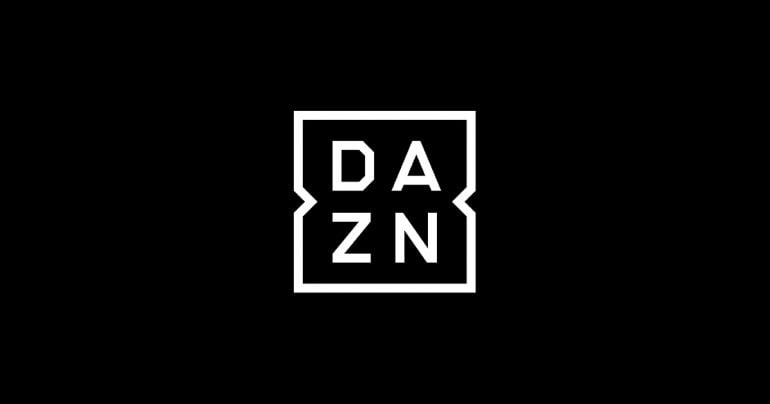
On May 10, 2018, Matchroom Boxing and Perform Group announced what was touted as a one-billion-dollar, eight-year joint venture.
Perform Group owns DAZN, an over-the-top subscription streaming video service that has launched sports-dedicated sites in Germany, Austria, Switzerland, Japan, and Canada. The Matchroom-Perform agreement calls for Matchroom to stage sixteen fight cards annually for eight years in the United States. DAZN will be the exclusive distributor in the United States for these events and also for twenty-two Matchroom “fight nights” that originate in the United Kingdom.
Of the sixteen shows that originate in the United States, Matchroom promises that four will be what it calls “gigantic events” or “tent-pole shows” while the other twelve will be “premium cable quality.”
Sky-TV has rights to televise the fights in the United Kingdom.
Eddie Hearn (managing director of Matchroom Boxing) and Simon Denyer (CEO of Perform Group) announced the joint venture at a press conference in New York. Former ESPN president John Skipper, who joined Perform Group as executive chairman on May 7, 2018, was also in attendance.
One billion dollars spread over eight years equals $125 million a year. That led Hearn to proclaim, “We have bigger rights fees than HBO and Showtime put together.”
Hearn also compared his new venture to Al Haymon’s launch of Premier Boxing champions three years ago with the observation, “They didn’t have a platform; they bought airtime. They had no broadcaster paying them money. They had an investment group that gave them money to acquire fighters, but they didn’t make progress with the money. We have a platform behind us. We have rights fees. We don’t have an amount of money to build a brand to sign fighters. We have rights fees to deliver shows.”
There was – and still is – a widespread belief that only the first two years of the Matchroom-DAZN contract are guaranteed and that the announced numbers are an exaggeration. Still, Hearn was far from shy in saying, “We’re here to change the game and elevate boxing to a new level for fight fans in America. We can televise the fights on the days we want at the time we want. We don’t have to come on at ten o’clock after a movie. We have the dates, the money, and the platform. We were dangerous without this. But with this money and this platform, omigod!”
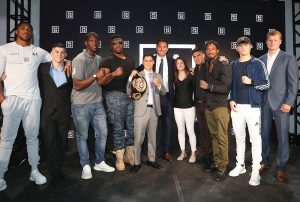
Left to right: Anthony Joshua, Rashat Mati, Nkosi Solomon, Daniel Roman, Eddie Hearn, Katie Taylor, Jessie Vargas, Demetrius Andrade, Nikita Ababiy and Alexander Povetkin at the DAZN U.S. launch on July 15 in New York. (Photo by Johnny Nunez – Getty Images for DAZN)
Two months later, on July 17, Hearn met again with the media. This time, there were questions regarding what appeared to be a thin roster of American fighters. Addressing this issue, Hearn declared, “We live in a world where people say, ‘Ah, he didn’t get Charlo or Spence.’ Calm down. We’ve just had seven or eight weeks. We’re getting so much resistance from advisers and networks, which is really good news because it means they’re concerned. We’re out there actively talking to Mikey Garcia, talking to the Charlos. We can pay them more money than [other promoters]. There are contracts out with another dozen fighters. We’ve signed three world champions [Maurice Hooker, Daniel Roman, and former champion Jesse Vargas]. We’ve signed a number one middleweight in Demetrius Andrade. We’ve signed a load of really good amateurs. I’m really pleased with the start. We’re going to cause nightmares. We are resilient. We are absolutely ruthless. We won’t stop. And we’ve got a team of people behind us who have a bottomless pit of money who will back us to the heavens. We’ve got eight years to make it work.”
In many respects, the DAZN-Matchroom venture is personality driven. That personality is Eddie Hearn. He recruits fighters, engages the media, and sells to the public. His team in the United States includes, inter alia, director of boxing Frank Smith (widely regarded as one of the most capable young guns in boxing today), head of media Anthony Leaver (efficient and popular with the media), and the head of operations for Matchroom USA, Josh Roy, who handles logistics well.
In July, the incomparable Michael Buffer signed a two-year exclusive agreement to serve as ring announcer for Matchroom’s fights worldwide and forego announcing for other promoters. Buffer is slated to work all of Matchroom’s shows that originate in the United States and most of its shows that originate in Europe.
Meanwhile, DAZN is positioning itself as a combat sports destination in the United States and has already moved beyond Matchroom in acquiring boxing content. On July 2, 2018, it announced that it would televise all seven fights in each of the three weight divisions in season two of the World Boxing Super Series. It will also showcase mixed martial arts bouts promoted by Bellator and Combate Americas.
The list of European-based boxers with promotional ties to Matchroom includes Anthony Joshua, Aleksandr Usyk, Dillian Whyte, Dereck Chisora, Kell Brook, Amir Khan, Katie Taylor, and popular local fighters like Tony Bellew, Conor Benn, Ricky Burns, Ryan Burnett, Anthony Crolla, Callum Johnson, Gavin McDonnell, Scott Quigg, and Callum Smith. But Matchroom USA’s roster is thin, and it’s having difficulty signing world-class American fighters for its DAZN venture.
Hearn’s May 10, 2018, press conference was an open announcement that Matchroom wants to sign fighters. Leading potential targets at that time included Errol Spence, Jarmall and Jarmell Charlo, Gennady Golovkin, Canelo Alvarez, Terence Crawford, Mikey Garcia, and Deontay Wilder.
“Eddie Hearn is trying to hit a grand slam,” one observer noted. “But he hasn’t loaded the bases yet.”
American-based fighters currently in the Matchroom-DAZN portfolio include Demetrius Andrade, Maurice Hooker, Daniel Roman, Jesse Vargas, and Tevin Farmer. Jarrell Miller isn’t locked in yet. After Danny Jacobs’s obligation to fight Sergiy Derevyankchenko on HBO on October 27 is fulfilled, he too will be available for DAZN. Russian-born Artur Beterbiev (who fights out of Canada) is also on the list.
One problem Hearn has had in getting fighters to sign with Matchroom is that all world-class boxers like to think of themselves as potential pay-per-view attractions. Hearn has said that DAZN will eschew pay-per-view fights. Also, to date, Matchroom USA has reportedly been reluctant to enter into contracts with American fighters that last for more than two years.
DAZN costs $9.99 a month for up to three devices. It launched in the United States on Sepember 10 and distributed its first fight card on September 22 when Anthony Joshua defended his WBA, IBF, and WBO belts against Alexander Povetkin.
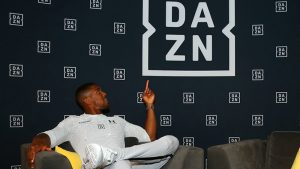
Anthony Joshua’s IBF/WBA/WBO heavyweight title defense against Alexander Povetkin, on September 22, was only available on DAZN in the U.S.
Joshua is a huge star in the United Kingdom and a power center unto himself, which in part is a tribute to Hearn’s promotional genius. In four fights over the past seventeen months, he has put 320,000 fans in seats and engendered more than three million pay-per-view buys in the UK. Anyone who asks why Perform Group chose to invest as heavily as it has with Matchroom should consider this: If you go to an Anthony Joshua fight and are engulfed by eighty thousand screaming fans, you’ll be impressed.
When the Joshua-Povetkin telecast on DAZN began, many viewers were greeted by a rude surprise. There was no streaming video. A “live chat” with the DAZN technical department brought a message to the screen advising that browsers other than Chrome might experience compatibility issues. Even with Chrome, some viewers described the video as skipping and uneven. Also, the audio was slightly out of sync with the visual.
DAZN isn’t alone in the technical glitch department. ESPN+ is incompatible with older models of Apple TV.
Brian Kenny, Sugar Ray Leonard, and Sergio Mora called Joshua-Povetkin from ringside. Less commentary from Mora and more from Leonard would have been welcome.
Joshua stopped Povetkin in the seventh round. Attention now turns to what Matchroom will offer boxing fans on DAZN until A.J. (whose contract with Matchroom and Sky Sports runs until 2021) fights again on April 13, 2019.
Hearn says that he’s trying to duplicate in the United States what he has done successfully in England. But what works in England won’t necessarily work in America. The social media strategy that sparks ticket sales for boxing in the UK hasn’t been as effective to date on this side of the Atlantic.
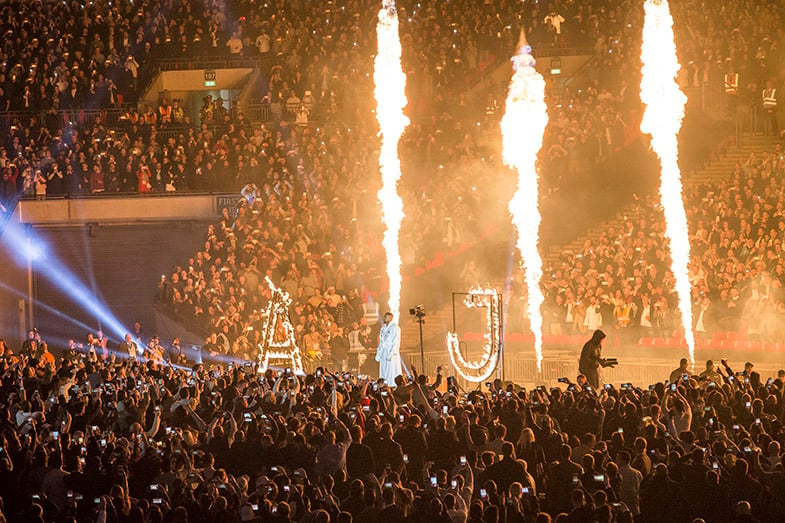
Joshua’s spectacular ring walk-in production for his showdown with Klitschko.
One area where Matchroom says it’s determined to change the paradigm for boxing in the United States is in improving the experience for fans who are on site. This also matters to DAZN because onsite enthusiasm translates into a more entertaining experience for viewers at home. The experience of watching Joshua knock out Wladimir Klitschko on television was enhanced by the fact that it happened in front of 90,000 screaming partisans.
However, the two Matchroom USA fight cards currently slated for DAZN are unlikely to engender on-site pandemonium. The first will take place in Chicago on October 6 and features four fights: Artur Beterebiev vs. Callum Johnson, Jessie Vargas vs. Thomas Dulorme, Daniel Roman vs. Gavin McDowell, and Jarrell Miller vs. Tomasz Adamek. Beterbiev, Vargas, Roman, and Miller are expected to win. Miller-Adamek is widely regarded as a travesty.
Adamek is just shy of 42 years old. He has life-style issues, is eighty pounds lighter than Miller, and was knocked out two years ago by Eric Molina. He also has a loss to Artur Szpilka on his record. If Matchroom needs Tomasz to sell tickets to Chicago’s Polish-American community, he should be on the card against someone other than Miller. Expectations for the fight are so low that, if it turns out to be competitive, Jarrell will be devalued.
Two weeks later – on October 20 – Matchroom’s second American-based fight night on DAZN is scheduled to showcase IBF 160-pound beltholder Billy Joe Saunders against Demetrius Andrade. Saunders is promoted by Frank Warren, but the fight went to a purse bid which Hearn won. Katie Taylor vs. Cindy Serrano, Scott Quigg vs. TBA, and Tevin Farmer vs. James Tennyson will also be on the card.
Earlier this month, the Daily Mail posted a video that showed Saunders promising a woman 150 pounds (currency, not weight) worth of crack if she performed a sex act on one of his friends and punched an innocent passer. The punch was captured on video. The sex act was not.
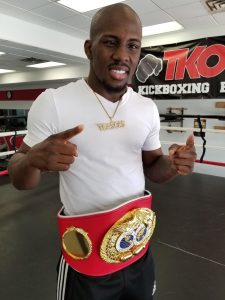
Farmer is the newly-minted IBF 130-pound titleholder.
Meanwhile, Matchroom’s signing of Farmer has raised eyebrows. Tevin began his career on a tenuous note with four losses and a draw in his first twelve fights. He has been unbeaten since then and, on August 3, won the vacant IBF 130-pound title, decisioning the very beatable Billy Dib. But there are many fighters who are more exciting to watch than Tevin and would be favored to beat him. One can argue that collecting belts will enable Matchroom to attract quality fighters who want to fight for these belts. But at some point, this pursuit has to translate into entertaining fights.
Farmer-Tennyson might be an area where the interests of Matchroom and DAZN don’t fully coincide. Hearn has signed Farmer to a four-fight deal potentially worth $2,000,000 plus what Matchroom pays to Farmer’s promoter, Lou DiBella. That’s well above market value.
Tennyson is from Northern Ireland and has fashioned a 22-2 (18 KOs) record against suspect competition. One of his losses was a second-round knockout defeat at the hands of a fighter with 2 wins in 71 fights. Signing Farmer might eventually get Matchroom another belt for one of its UK fighters and boost its ratings on Sky-TV. But how much would that benefit DAZN?
There are still big names that Matchroom might lure to DAZN. Canelo Alvarez, Gennady Golovkin, Mikey Garcia, and Manny Pacquiao come quickly to mind, although Pacquiao now speaks more to boxing’s past than its future.
The larger question facing Matchroom and DAZN today is the nature of the platform.
The key to Top Rank’s deal with ESPN is the platform. ESPN+ has the entire ESPN empire to advance its boxing franchise. It can push fights and fighters into the consciousness of sports fans across America.
Fox and Showtime (whose relationship with PBC will be explored in Part Three of this series) have built-in sports marketing machines. FOX is a major broadcast network. Showtime has permeated the boxing market.
DAZN can’t equal this level of marketing and promotion. It’s an over-the-top streaming video service that relatively few people in America are aware of. And because DAZN is largely unknown at present, fighters who appear on DAZN risk becoming close to invisible insofar as most sports fans in the United States are concerned. How can Matchroom USA build fighters as commercial attractions if virtually no one sees them?
Or phrased differently; if the same content that Top Rank is putting on ESPN now was on DAZN, that content would cause less of a stir than it does on ESPN. ESPN is reaching out to the broadest audience possible and hoping to convert casual sports fans to boxing. DAZN is reaching out to hardcore combat sports fans.
That said; it’s important to remember that the Matchroom-DAZN alliance is only four months old. They’re just starting. They need time to build a brand. A crash program won’t do it. As Wernher von Braun (an early architect of America’s space program) observed, “Crash programs fail because they are based on the theory that, with nine women pregnant, you can get a baby in a month.”
The key questions are: How many subscribers will DAZN attract? And what programming will attract them? At some point, DAZN could add more supplemental boxing programming (as it has already done with the World Boxing Super Series). It could invest heavily in non-combat sports, particularly as current license-fee agreements between television networks and various leagues expire. For now, the destinies of DAZN and Matchroom are linked. But they’re two separate entities. Each is capable of surviving without the other.
Can DAZN build a successful platform in the United States? Who knows? Twenty years ago, virtually no one had heard of Netflix.
This is the second installment in a three-part series. Part One of “The New Order and the Future of Boxing” was posted here. Part Three will be posted tomorrow.
Thomas Hauser can be reached by email at [email protected]. His next book – Protect Yourself at All Times – will be published by the University of Arkansas Press this autumn. In 2004, the Boxing Writers Association of America honored Hauser with the Nat Fleischer Award for career excellence in boxing journalism.














